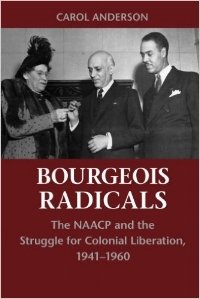MEET THE ADVISOR: DR. CAROL ANDERSON, AUTHOR OF WHITE RAGE
Dr. Carol Anderson
When preparing a grant proposal for the National Endowment for the Humanities (NEH), it’s critical that you have a strong, well-informed core group of humanities scholars at the top of their fields as part of your advisory team. It’s really their insight and knowledge that keeps your project solid in its scholarship and relevant to the humanities themes the NEH wants to see woven throughout your film’s narrative arc. After Dr. Michael Krenn, the author of the book Black Diplomacy, agreed to join our project as an advisor, it was time for me to reach out to other scholars whose work was reflected in the themes of the film. I asked Dr. Krenn for his suggestions on scholars who could contribute to this conversation and without hesitation he said, Dr. Carol Anderson. The word he used to describe her was “dynamic” and after my first conversation with her, I knew he was right.
Dr. Carol Anderson is a professor of African American Studies at Emory University and her research centers on the interconnectedness of the American civil rights movement and decolonization. I knew immediately I wanted her as part of our team because her work really gives context to our film’s story. During the time our main protagonists were breaking down barriers in the State Department, African American leaders were making connections between the struggle for freedom at home with the struggle for freedom abroad, and organizations like the NAACP were actively seeking more representation in the State Department and other institutions so that black voices and interests could be put on the agenda. But it’s not only Dr. Anderson’s work that intrigued me; she is sharp, engaging, and can tell a good story. I knew we needed to get her in front of a camera. It’s no surprise she was recently named as one of the Politico 50, or that her contribution to Jesmyn Ward’s The Fire This Time and her most recent book, White Rage, have garnered such wonderful critical acclaim. Lucky for us, she wanted to be part of the team.
1. Much of your research looks at the NAACP and the work it did to link the international movements for independence and self-determination with the domestic civil rights struggle. What inspired you to pursue this research?
Several factors came into play. The first book, Eyes Off the Prize: The United Nations and the African American Struggle for Human Rights, 1944-1955 (Cambridge: 2003), began as a research paper in a graduate seminar. I was intrigued how scholars of civil rights, decolonization, and the Cold War barely referenced each other. It just didn’t seem logical that the same people kept popping up in these disparate stories occurring at roughly the same time but without the knowledge of their engagement in these other realms.
On a more personal level, I wanted to understand how my neighborhood, with so many God-fearing, hardworking people devolved into the ‘hood’ – high unemployment, drugs, no grocery stores, no significant businesses, resource-starved schools -- especially in the wake of the Civil Rights Movement and its achievements. I came across Malcolm X’s saying on human rights, which was heralded at the time, and was intrigued. But, as I began my research, I realized that the NAACP with W.E.B. Du Bois had actually conceptualized the black freedom struggle as a human rights issue in the 1940s (two decades before Malcolm!). The Association asserted that black equality, given hundreds of years of slavery and Jim Crow, would require not only the right to vote, the right to a fair trial, freedom of speech, etc., but also the right to education, housing, employment, etc. Then my question became, if the NAACP saw the importance of human rights in the early 1940s and fought for it, why were so many people applauding Malcolm like it was the first time it had ever been said? What could be powerful enough to create that depth of amnesia, in less than twenty years, between the NAACP and Malcolm’s human rights activism? The answer began to unfold in the archives. The Cold War and anti-communism led conservatives, the Southern Democrats, the State Department, and many white liberals to link human rights with the Soviet Union. For example, the basic right to health care became demonized as “socialized medicine.”
Bourgeois Radicals: The NAACP and the Struggle for Colonial Liberation, 1941-1960 (Cambridge, 2014) also emerged out of the archives. Nearly 40 years of scholarship asserted that because of the Cold War and President Truman throwing some civil rights crumbs to the Association, the NAACP turned its back on anti-colonial movements. That story had been repeated so often, it was just taken as fact. Gospel. Well, when I was finishing up Eyes Off the Prize, I made one last run through the NAACP Papers at the Library of Congress, to ensure that I hadn’t missed anything. I looked at the finding aid again, but for the first time really saw it. There were all of these boxes marked “Africa”! If the NAACP turned its back, I thought, what was it doing with all of this correspondence that took up box after box after box? I was curious (nice word for “nosy”) and peeked in one of the boxes although it was not on my research agenda for that week. There was this letter, dated 1949, two years after the NAACP had supposedly abandoned colonial people struggling to be free. The note was from Abdullahi Issa, the head of the Somali Youth League, thanking the Association for all of its help in the United Nations to keep Italy from regaining control of that colony. I was stunned. This wasn’t supposed to be. The NAACP was not supposed to be engaged in this at all; everybody said so. Once I put Eyes Off the Prize to bed, I began work to uncover what the Association was doing.
It turns out they were “inside” fighters; working the halls of power and in the bureaucracies to delegitimize colonialism and empires. They systematically maneuvered to change what had been a source of status and power into something with so much baggage and opprobrium the European powers were forced to eventually jettison. (Note it wasn’t as smooth and glib as that sentence, but increasingly in the UN, Britain, France, Belgium & co. were on the defensive.)
2. The NAACP was very persistent in lobbying the State Department for more representation and inclusion in the Foreign Service. In fact, Edward R. Dudley, the first African American ambassador, was tapped by Walter White, the head of the NAACP at the time, to represent the U.S. in Liberia. How important was the NAACP in getting more representation in the State Department?
Ambassador Edward R. Dudley
Photo Credit:
Amistad Research Center
The NAACP asked out loud and repeatedly how the United States, in taking on the Soviets, could strut across the global stage as the Jim Crow Leader of the Free World? It was an oxymoron. If the United States wanted to model what a thriving democracy looked like, particularly to a world that was overwhelming comprised of people of color, then the Foreign Service could not be hampered by racial discrimination. In short, the nation’s representatives needed to be representative of the nation. That was easier said than done, which gives some indication of how entrenched racism was – even in the face of a national security imperative. As Michael Krenn so beautifully laid out, the State Department had its own version of the chitlins’ circuit, which were the limited number of nations where African Americans could be posted. Liberia was one of those nations.
3. The racial violence and segregation between the 40's and 60's really called into question the legitimacy of American democracy and freedom. Do you think this crisis of legitimacy is still relevant today?
Absolutely. While the military and economic might of the United States are not to be discounted, what makes those more fungible is the nation’s soft power – the notion of a city on a hill, of the Land of Opportunity, of a rights-based society. Yet, one dead black body after the next – Eric Garner, Rekia Boyd, Aiyanna Stanley-Jones, Kathryn Johnston, Michael Brown, Amadou Diallo, Patrick Dorsimond, Jonathan Ferrell, Sean Bell, Freddie Gray, Sandra Bland, Samuel DuBose, Walter Scott . . . . . . Has led the British newspaper, Guardian, to begin to document the number of deaths at the hands of the police in the United States. And even though his hands are blood-drenched, President Rodrigo Duterte pointed to all of the African Americans slain by the police and dared President Obama to even broach the subject of the killings in the Philippines.
Photo Credit: Nation of Change
The multiple deaths, the overwhelming refusal of the justice system to indict or find guilty, and the racial violence at rallies for Donald Trump, have caused many in the international community to question what is happening in the United States.
4. Why do you think it's important to tell these stories?
The National Museum of African American History opened this weekend. On stage with the president was the daughter of a man who had once been enslaved. We are still in living memory of chattel slavery. The stories of struggle, hardship, achievement, honor, and victory are the threads that weave together this tapestry of America. Without these stories, the fabric is weakened, there are holes, and the margins are frayed and become even more tattered. A nation’s history is silenced without these stories.
5. What are your current projects?
I have a shorter piece on the politics of respectability. I’m starting a new book project on African Americans and Haiti, Congo, and Nigeria in the 1960s. I’m also finishing up an article on the collaboration between the NAACP and the African National Congress to take down a series of World Bank loans to apartheid South Africa in the early 1950s (well before the divestment movement).
6. Since we are making a documentary, we can't end the interview without asking this central question: What is your favorite documentary film and why?
Pray the Devil Back to Hell. Here you see the power of the seemingly powerless non-violently topple a corrupt, blood-thirsty regime. Women, undaunted by educational or religious differences, banded together to stop the civil war in Liberia and oust President Charles Taylor.
Carol Anderson is the Samuel Candler Dobbs Professor of African American Studies at Emory University.
You can find her work here.
Look for more Meet the Advisors posts in future FLOWSTATE Stories.






